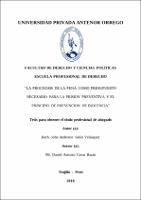La prognosis de la pena, como presupuesto necesario para la prisión preventiva y el principio de presunción de inocencia

View/
Download
(application/pdf: 5.916Mb)
(application/pdf: 5.916Mb)
Date
2018Author(s)
Salón Velásquez, John Anderson
Metadata
Show full item recordAbstract
La presente investigación busca determinar, de qué manera el presupuesto material de prognosis
de pena, regulado en el literal b del artículo 268 del Código Procesal Penal, resulta incompatible
con el principio de Presunción de Inocencia, establecido en el proceso penal de modelo
acusatorio contradictorio. Esta investigación es descriptiva y para su desarrollo se utilizaron
los métodos lógicos (inductivo, deductivo, análisis y síntesis) y jurídicos (exegético). Los
materiales empleados fueron, el Código Procesal Penal Peruano D.L. 957, la casación 626–
Moquegua, el Informe sobre el uso de la prisión preventiva en las Américas, así como la
doctrina que desarrolla el tema materia de estudio. Se llegó a la conclusión, que el presupuesto
material de prognosis de pena, como está regulado en el literal b del artículo 268 el Código
Procesal Penal, si es interpretado restrictivamente, vulnera el principio de presunción de
inocencia, ya que implica que existirá una sanción condenatoria superior a 4 años, en una etapa
del proceso donde no corresponde y mediante una medida destinada a asegurar los fines del
proceso y no a condenar. The present investigation seeks to determine, how the material budget of prognosis punishment,
regulated in the literal b of article 268 of the Code of Criminal Procedure, it is incompatible
with the principle of presumption of innocence established in the criminal process of
contradictory accusatory model. This investigation is descriptive and for their develpment were
used the logical methods (inductive, deductive, analysis and synthesis) and legal (Exegitical).
The materials used were, the Code of Criminal Procedureof Perú D.L. 957, the cassation 626-
2013 Moquegua, the report on the use of pretrial detention in the americas,as well as the
doctrine that develops the subject matter of study. The conclusion was reached, that the material
budget of punishment prognosis, how is it regulated in the literal b of article 268 of the Code
of Criminal Procedure, if it is interpreted restrictive, violates the principle of presumption of
innocence since it implies that there will be a condemnatory sanction superior to 4 years, in a
stage of the process where it does not correspond and by means of a measure designed to ensure
the ends of the process and not to condemn.
Collections
- Derecho [477]

